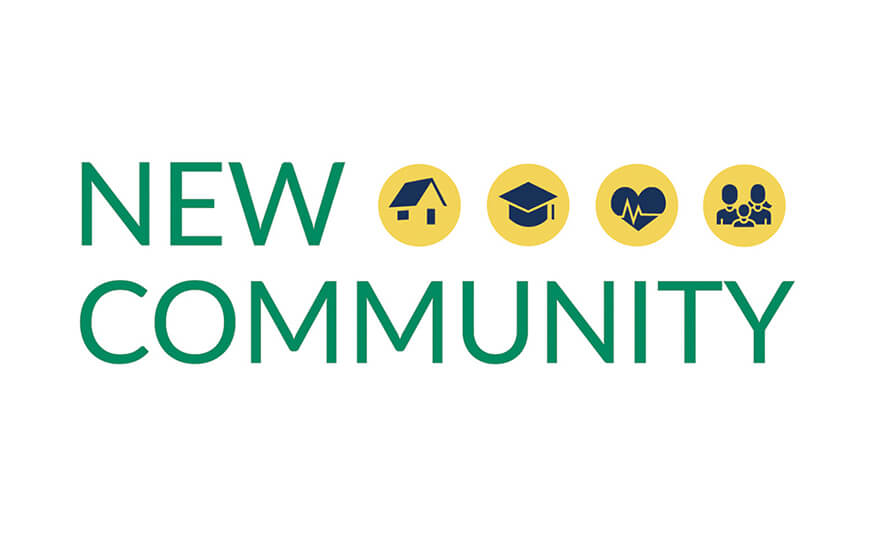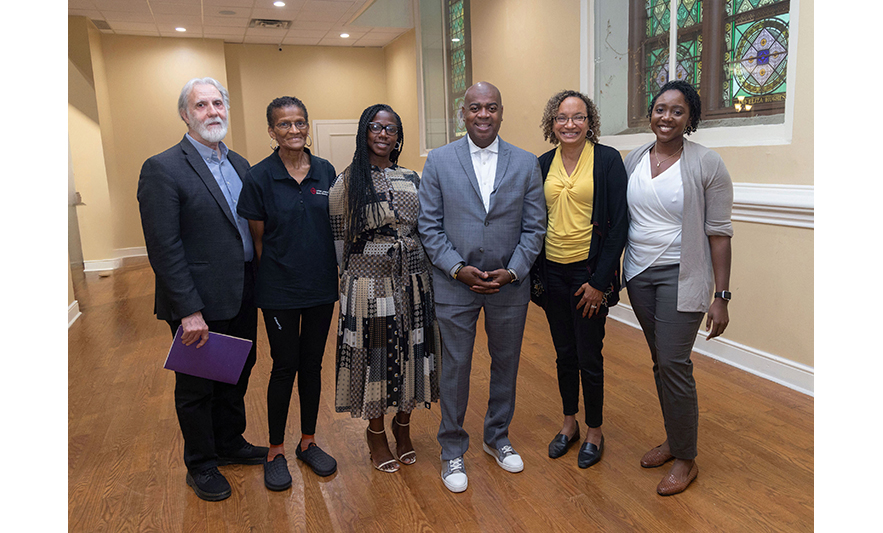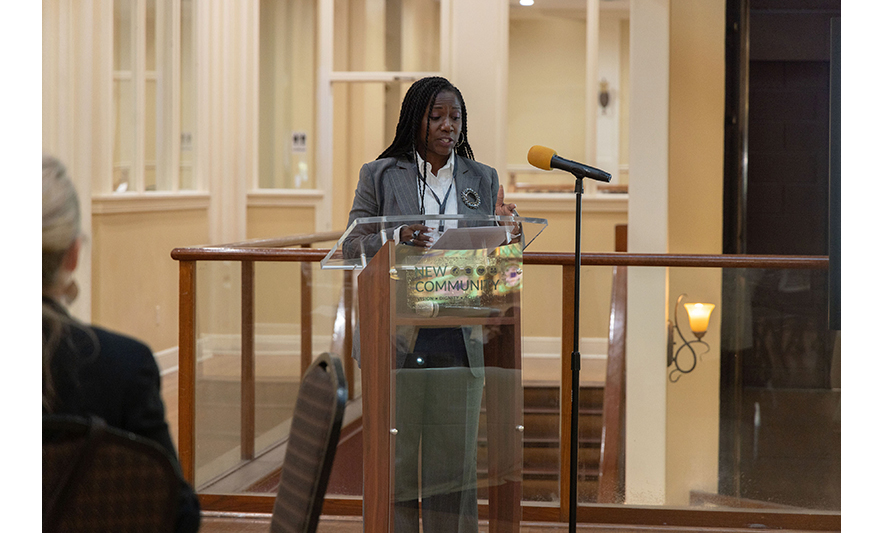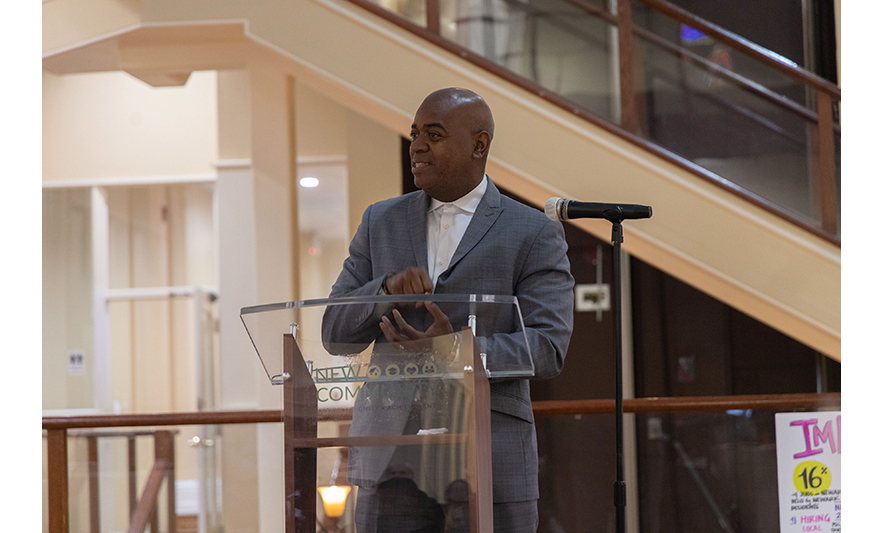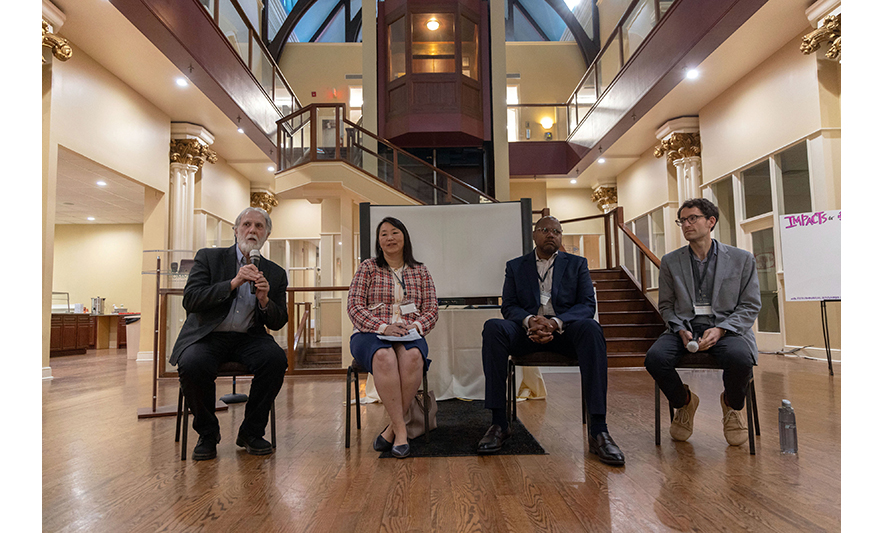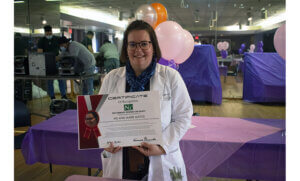Photos by Tamara Fleming Photography.
New Community served as the host site for the Newark gathering of organizations and entities involved in the Building Healthier, More Equitable Communities (BHEC) initiative. The BHEC Newark Convening was held on Oct. 25 and 26 at Monsignor William J. Linder Plaza, New Community’s corporate office location. The two-day event included participation from New Community, Newark Mayor Ras Baraka, Rutgers University Distinguished Professor of Law Dr. David Troutt, Urban League of Essex County, University Hospital and a variety of other organizations involved in the BHEC initiative.
The BHEC initiative, led by the Reinvestment Fund with funding from the Robert Wood Johnson Foundation, aims to address the social determinants of health through changes to the built environment and the community investment system in four New Jersey cities: Asbury Park, Camden, Newark and Paterson. Those involved in the city teams for the four areas meet at convenings at each of the cities to delve deeper into the work being done in each location. Urban League of Essex County and New Community guide the Newark team.
New Community CEO Simone Gagneron welcomed the group to Newark and provided a brief history of NCC. She explained the progress the organization has made over the past 55 years thanks to partners like the Reinvestment Fund and Robert Wood Johnson Foundation that support initiatives like BHEC.
“BHEC has helped us engage with partners in our work in the community, and begin to make the case to funders and policymakers for additional investment and support in the communities we serve,” she said.
Gagneron said gatherings like the BHEC Newark Convening allow for networking and for individuals to get a sense of the importance of their efforts.
“I hope you recognize that without you and the organizations you serve, the critical change work that needs to happen won’t happen,” she said.
Urban League of Essex County President and CEO Vivian Cox Fraser discussed her organization’s efforts and how the BHEC initiative aims to have entities work together to tackle large issues.
“Through our collaboration, we seek to address the widening chasm of economic inequality, concentrated in generational poverty, poor health outcomes and intractable inequities in health and opportunities,” she said.
Dr. David Troutt, Distinguished Professor of Law and Founding Director of Rutgers Center on Law, Inequality and Metropolitan Equity (CLiME), served as the keynote speaker for the BHEC Newark Convening. He discussed CLiME’s work of addressing issues of structural inequality and systemic racism, which includes the report Who Owns Newark? That research showed that about half of home purchases in Newark were made by institutional investors, primarily impacting neighborhoods with the highest proportion of Black residents and Black homeowners.
“It was driving up prices, it was driving people out, making it harder to enter as new homeowners and, of course, it was inextricably increasing rents because the whole model is a passive income model with steady gains,” Troutt said.
CLiME also looked into the issue of affordable housing for Newark and found that the city lacks an adequate number of affordable units.
“The local measure determines that affordability in the city of Newark based on household income for renters would be $763. And if that’s what affordable means, we need 16,000+ units,” he said.
Newark Mayor Ras Baraka talked about how the lack of housing in New Jersey and nationwide is the source of many of the problems residents face.
“Housing is the number one issue in this country,” he said. “There’s just not enough of it.”
He said the lack of housing in the suburbs directly affects cities like Newark because those who grow up in the suburbs can’t find affordable housing options in their hometowns. Because of that, they move to cities like Newark which have cheaper housing options than where they grew up and often where they work. Those individuals then become part of gentrification, not because they’re looking to displace people but because they don’t have other options.
Baraka praised those in attendance for their efforts and said he hopes the work continues because Newark and cities like it need investment in housing, affordable housing and neighborhood health care facilities.
Dr. Colette Barrow Adams, Executive Director of Community and Population Health at University Hospital, and Jill Crawford, Principal at Type A Projects, talked about the collaboration between the two entities to develop 78 units of affordable housing with an 8,000-square-foot health clinic on the ground floor. The project includes 16 units of supportive housing for those experiencing long-term homelessness or housing instability. University Hospital refers patients to the supportive housing units and will run the health clinic, which will be a medical practice open to all.
New Community Director of Community Engagement Richard Cammarieri moderated a panel discussion with Newark Deputy Mayor Allison Ladd, Invest Newark and Newark Land Bank President and CEO Marcus Randolph and Newark Alliance and Newark Anchor Collaborative CEO Evan Weiss. The group discussed examples of collaborative and cross-sector strategies to advance equity that are happening in Newark.
Attendees of the BHEC Newark Convening also participated in group discussions to talk about successes and challenges they have experienced in their work as well as a bus tour of sites throughout Newark and a reception at Akwaaba Gallery, a Newark-based art gallery.
More information about the BHEC initiative can be found at bhecnj.org.
